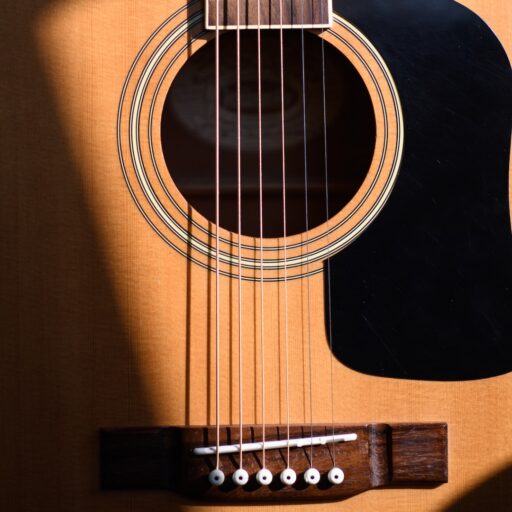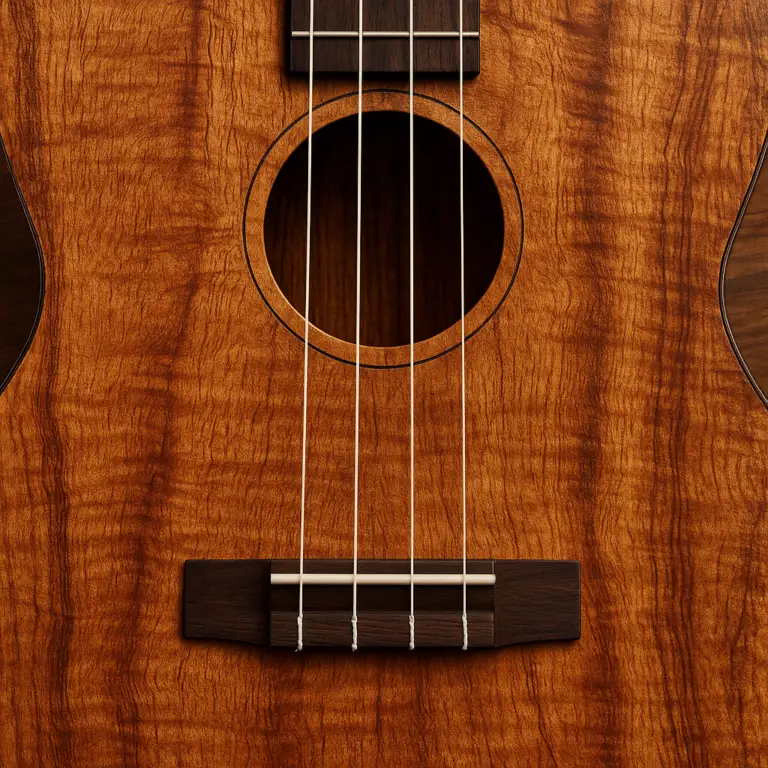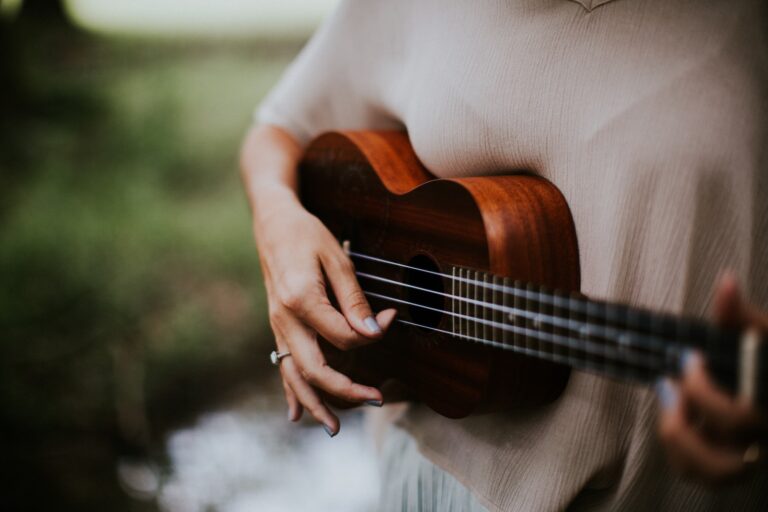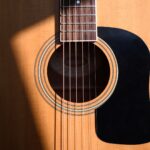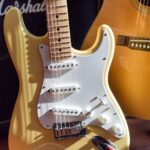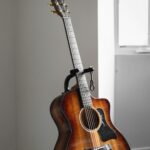Support our educational content for free when you purchase through links on our site. Learn more
Are Ukuleles Easier Than Guitars? 10 Surprising Truths 🎸🌺 (2025)
Video: Ukulele vs Guitar: Which One Should You Learn First? | Domestika English.
Picking up your first instrument can feel like standing at a musical crossroads. You’ve heard the buzz: ukuleles are easier, guitars are more versatile. But is that really the whole story? As seasoned musicians at Guitar Brands™, we’ve seen beginners light up with their first ukulele chord and others dive headfirst into the guitar’s vast ocean of sounds. In this article, we unravel 10 surprising truths about whether ukuleles are truly easier than guitars—and which might be the perfect fit for you.
Did you know that beginners often play recognizable ukulele songs within hours, while guitarists typically spend weeks just mastering basic chords? But the guitar’s rich tonal range and genre-spanning power can’t be ignored. Stay tuned as we break down everything from finger comfort to budget, and reveal our top beginner instrument picks that will have you strumming confidently in no time!
Key Takeaways
- Ukuleles offer a gentler learning curve with fewer strings, nylon strings, and smaller size, making them ideal for quick progress and finger comfort.
- Guitars provide unmatched versatility and a richer sound palette, perfect for players aiming to explore diverse genres and advanced techniques.
- Your hand size, musical goals, and practice time are crucial factors in choosing between the two.
- Budget-wise, quality beginner ukuleles generally cost less than quality beginner guitars, lowering the barrier to entry.
- Starting with a ukulele can build foundational skills transferable to guitar, but both instruments have thriving communities and abundant learning resources.
- Ready to start? Check out our curated lists of the best beginner ukuleles and guitars to kick off your musical journey with confidence!
👉 Shop Beginner Instruments:
- Kala Ukuleles on Amazon | Donner Ukuleles on Sweetwater
- Yamaha Acoustic Guitars on Amazon | Seagull Guitars on Guitar Center
Table of Contents
- ⚡️ Quick Tips and Facts
- 🎸 The Great Debate: Are Ukulele Easier Than Guitar?
- 📜 A Strum Through Time: The Origins of Ukulele and Guitar
- 🤔 What’s Your Musical Vibe? Asking the Right Questions Before You Choose
- 💰 The Price Tag Paradox: Budgeting for Your First Instrument
- ⚖️ Ukulele vs. Guitar: A Head-to-Head Showdown of Playability
- Size and Portability: Big or Small Adventures?
- Number of Strings & Tuning: Less is More, or More is Better?
- String Type & Finger Comfort: Nylon vs. Steel
- Fretboard Real Estate: Navigating the Neck
- Chord Shapes & Finger Dexterity: The Learning Curve
- Sound & Versatility: What’s Your Sonic Signature?
- Learning Resources & Community: Finding Your Tribe
- 🚀 The Ukulele Advantage: Why It Might Be Your First Strumming Success
- 🌟 The Guitar’s Grandeur: Why the Challenge is Worth It
- 🎯 Making the Call: How to Choose Your Perfect Musical Partner
- 🏆 Our Top Picks: Best Beginner Ukuleles & Guitars to Get You Started
- 🛠️ Essential Accessories for Your New Instrument
- 📚 Beyond the First Strum: Learning Resources & Practice Tips
- 🤯 Common Myths & Misconceptions Debunked
- 🎉 Conclusion: Your Musical Journey Starts Now!
- 🔗 Recommended Links: Dive Deeper into Your Passion
- ❓ FAQ: Your Burning Questions Answered
- 📖 Reference Links: Our Sources & Further Reading
Here is the main body of the article, crafted by the expert team at Guitar Brands™.
⚡️ Quick Tips and Facts
In a hurry? We get it. You’ve got songs to play! Here’s the lightning-round, no-fluff breakdown of the ukulele vs. guitar showdown.
| Feature | Ukulele 🌴 | Guitar 🎸 | The Lowdown |
|---|---|---|---|
| Number of Strings | 4 | 6 (or more!) | Fewer strings on the uke mean simpler initial chord shapes. |
| String Material | Soft, pliable nylon | Steel (acoustic/electric) or Nylon (classical) | Nylon is much gentler on beginner fingertips. No contest. |
| Size & Weight | Small, lightweight | Larger, heavier | The ukulele is the undisputed champion of portability. |
| Tuning | G-C-E-A (Standard) | E-A-D-G-B-E (Standard) | The uke’s tuning makes many common chords a breeze. |
| Fret Size | Smaller, closer together | Wider, further apart | Great for smaller hands on the uke; can be a stretch on guitar. |
| Typical Sound | Bright, cheerful, “plinky” | Rich, deep, versatile | Think beach vibes vs. campfire singalongs (and everything else!). |
| Initial Learning Curve | ✅ Generally easier | ❌ Generally steeper | You’ll likely play your first song faster on a ukulele. |
Key Takeaways for Aspiring Rockstars:
- ✅ For instant gratification and ease on the fingers, the ukulele is your best friend. You can be strumming a recognizable tune in a surprisingly short amount of time.
- 🎸 For ultimate versatility across genres like rock, blues, country, and pop, the guitar is the undisputed king. The journey might be tougher, but the sonic kingdom is vast.
- 🤔 The “easier” instrument is the one you’re most excited to pick up and play every day. As the folks at Ukulele Tricks wisely put it, “Follow your inspiration and influences as you pursue your musical journey and you’ll be more motivated.”
🎸 The Great Debate: Are Ukulele Easier Than Guitar?
Ah, the age-old question! It’s the musical equivalent of “which came first, the chicken or the egg?” Ask any ten musicians, and you’ll likely get ten different answers, a heated debate, and maybe a free lesson. Here at Guitar Brands™, we’ve seen countless beginners grapple with this exact dilemma. You see a guitar and imagine yourself on a stadium stage, then you see a ukulele and picture a relaxing beachside jam. But which one will get you making music, not just noise, the fastest?
The short answer is: Yes, the ukulele is generally easier to start playing than the guitar. But hold on! That little word, start, is doing a lot of heavy lifting. The journey from plucking your first string to mastering an instrument is a long and winding road, regardless of which path you choose. We’ve written an entire guide to the wonderful world of the ukulele that you should check out!
This article is your all-access pass to understanding the real differences. We’re going to dissect everything from finger pain to brain strain, from your wallet to your musical soul. By the end, you won’t just know which is “easier”—you’ll know which is right for you.
📜 A Strum Through Time: The Origins of Ukulele and Guitar
Ever wonder how these stringed sensations came to be? Their histories are as rich and varied as their sounds!
The guitar’s lineage is a sprawling, epic tale. Its ancestors can be traced back thousands of years to stringed instruments in ancient Egypt and Mesopotamia. The version we’d recognize, the six-string Spanish vihuela, emerged in the 16th century. From there, it evolved, traveled the world, and became the backbone of countless genres, from classical concertos to face-melting metal solos. It’s an instrument with some serious history in its headstock.
The ukulele, on the other hand, has a more recent and specific origin story. In 1879, Portuguese immigrants brought a small, four-stringed instrument called the machete de braga to Hawaii. The local Hawaiians were captivated by the fast, intricate fingerwork of the players. They nicknamed the instrument “ukulele,” which translates to “jumping flea,” a perfect metaphor for the players’ flying fingers! King Kalākaua, the “Merrie Monarch,” fell in love with it and championed it as a symbol of Hawaiian culture. From there, this little “jumping flea” hopped across the Pacific to the mainland US and, eventually, the world.
So, you have one instrument with ancient, globe-trotting roots and another with a vibrant, island-born heritage. Does this history affect how they’re played? Absolutely! The guitar’s long evolution gave it a wider “vocabulary” across genres, while the ukulele’s joyful origin is baked right into its cheerful tone.
🤔 What’s Your Musical Vibe? Asking the Right Questions Before You Choose
Before you even think about wood types or string gauges, you need to have a little chat with yourself. Choosing an instrument is like choosing a dance partner—you need to find one that matches your style.
Your Musical Goals & Aspirations
- Are you looking for a fun, casual hobby? Do you want to be able to strum some chords and sing along with friends at a party? If so, the ukulele’s quick learning curve is a massive plus. ✅
- Do you dream of writing complex songs, shredding solos, or joining a band? The guitar’s wider range and sonic versatility make it the go-to choice for more ambitious musical projects. 🎸
Your Preferred Genres & Sound
What music makes you tap your feet?
- Love folk, pop, or indie music with a light, airy feel? Think artists like Jason Mraz or Grace VanderWaal. The ukulele will feel right at home.
- Are you into rock, blues, country, metal, or flamenco? While you can play these on a uke, the guitar is the native language for these genres. It has the depth, sustain, and power they demand.
Your Physical Comfort & Hand Size
This is a big one that often gets overlooked.
- Do you have smaller hands or struggle with finger strength? The ukulele’s smaller neck and nylon strings will be much more comfortable. As Ukulele Tricks notes, “If you have small hands and fingers, then, the ukulele is probably a great choice for you.”
- Do you have larger hands? You might find the ukulele’s fretboard a bit cramped. A guitar, or even a larger tenor or baritone ukulele, could be a better fit.
Your Dedication & Practice Time
Be honest with yourself.
- Can you only spare a few minutes here and there? You’ll see more satisfying progress on the ukulele in shorter bursts of practice.
- Are you ready to commit to a more structured practice routine? The guitar rewards dedication, but it can be frustrating if you don’t put in the time to build calluses and master tricky chords.
💰 The Price Tag Paradox: Budgeting for Your First Instrument
Let’s talk money. While you can find instruments at every price point, there’s a general trend you should know about.
Generally speaking, getting a quality, playable ukulele is significantly more affordable than getting a quality, playable guitar. This is a major point of consideration for any beginner. A poorly made instrument, uke or guitar, is a recipe for frustration. It won’t stay in tune, the notes will sound “off” even when you’re fretting correctly (a problem called poor intonation), and it will fight you every step of the way.
As the experts at Ukulele Tricks state, “Learning an instrument is already hard enough, so you don’t make it harder on yourself by having a poor quality instrument!” They suggest you can find a great beginner ukulele for under $100, while a solid beginner guitar often starts closer to the $500 mark.
- Ukulele: Brands like Kala, Lanikai, and Donner offer fantastic entry-level instruments that are fun to play and won’t break the bank.
- Guitar: For a first acoustic guitar, our Guitar Buying Guide often points beginners towards brands like Yamaha, Seagull, or Fender’s acoustic lines. These offer a great balance of quality and value.
The takeaway? Your budget can get you a higher-quality instrument in the ukulele world than it can in the guitar world, which can make your initial learning experience much more enjoyable.
⚖️ Ukulele vs. Guitar: A Head-to-Head Showdown of Playability
Okay, let’s put these two contenders in the ring and see how they stack up, feature by feature. This is where the rubber meets the road (or, rather, where the finger meets the string).
Size and Portability: Big or Small Adventures?
- Ukulele: Tiny. Lightweight. You can stuff a soprano uke in a backpack. It’s the ultimate travel companion. Taking it to the beach, a campfire, or a friend’s house is effortless. ✅
- Guitar: Bulky. Heavier. Requires a dedicated case and a bit more planning to transport. It’s less of a “grab-and-go” instrument. ❌
- Winner: Ukulele, by a country mile.
Number of Strings & Tuning: Less is More, or More is Better?
- Ukulele: Four strings, typically tuned G-C-E-A. This “re-entrant” tuning (where the G string is higher than the C string) gives it that classic, bright jangle. The limited number of strings simplifies chord shapes dramatically. A C major chord is just one finger!
- Guitar: Six strings, tuned E-A-D-G-B-E. This provides a huge tonal range, from deep bass notes to high treble notes. However, it also means more strings to manage, both for your fretting and strumming hands. A basic C major chord requires a three-finger yoga pose for beginners.
- The Verdict: The ukulele is simpler and more intuitive for absolute beginners. The guitar offers a far greater harmonic and melodic range for intermediate and advanced players.
String Type & Finger Comfort: Nylon vs. Steel
This is perhaps the single biggest factor in the “easier” debate.
- Ukulele: Uses soft, forgiving nylon strings. They have lower tension and are much easier to press down. You’ll still get a little tenderness, but the dreaded “beginner fingers” phase is significantly shorter and less painful. ✅
- Acoustic Guitar: Typically uses steel strings. They are under high tension and can feel like cheese wire to uninitiated fingertips. Building up calluses is a rite of passage, and it can be a painful one that discourages many new players. ❌
- The Verdict: For pure physical comfort, the ukulele wins, hands down. This is a huge advantage, especially for younger players or adults with sensitive skin or conditions like arthritis.
Fretboard Real Estate: Navigating the Neck
- Ukulele: The neck is shorter, and the frets (the metal bars) are closer together. This is fantastic for people with smaller hands, as complex chords don’t require as much stretching.
- Guitar: The neck is longer and wider, with more space between the frets. This can be a challenge for small hands, as some chords require a significant reach. However, it also provides more room for your fingers, which can be helpful for players with larger hands who might feel cramped on a uke.
- The Verdict: It’s a tie, depending on your hand size. Small hands favor the uke; large hands might prefer the guitar’s extra space.
Chord Shapes & Finger Dexterity: The Learning Curve
- Ukulele: Basic chords (C, G, Am, F) are incredibly simple, often requiring just one or two fingers. You can learn enough chords to play hundreds of popular songs in a single afternoon. ✅
- Guitar: Basic chords are more complex and physically demanding. The dreaded F major barre chord is a legendary roadblock for beginners, requiring one finger to press down all six strings at once. It takes significant time and practice to build the required hand strength. ❌
- The Verdict: The ukulele offers a much gentler and faster path to playing actual songs.
Sound & Versatility: What’s Your Sonic Signature?
- Ukulele: Produces a bright, happy, treble-focused sound. It’s fantastic for accompanying singing and has a charming, infectious personality. However, its dynamic and tonal range is limited.
- Guitar: Offers a vast sonic palette. From the warm, woody tones of an acoustic guitar to the growl of an electric, the possibilities are nearly endless. It can be a rhythm instrument, a lead instrument, a solo classical voice—you name it.
- The Verdict: The guitar is the clear winner in terms of versatility and expressive potential.
Learning Resources & Community: Finding Your Tribe
- Ukulele: The ukulele community is known for being incredibly friendly, welcoming, and supportive. There are countless online resources, YouTube tutorials, and local ukulele clubs.
- Guitar: As one of the most popular instruments in the world, the number of learning resources for guitar is staggering. From online courses and apps to legendary instructional books and a universe of YouTube teachers, you will never run out of things to learn.
- The Verdict: It’s a draw. Both instruments have massive, supportive communities and a wealth of learning materials.
🚀 The Ukulele Advantage: Why It Might Be Your First Strumming Success
So, we’ve established the ukulele is easier to start. But let’s break down exactly why that is and what it means for you. Here are 8 solid reasons the uke might be your perfect entry into the world of music.
1. Faster Initial Progress & Instant Gratification
The feeling of playing your first real song is pure magic. With the ukulele’s simple one and two-finger chords, that magic moment can happen within your first day of playing. This early success is a powerful motivator that keeps you coming back for more.
2. Gentler on the Fingers
We can’t stress this enough. The soft nylon strings are a game-changer. You can practice for longer periods without pain, which accelerates learning. No need to “power through the pain” like with steel-string guitars.
3. More Portable & Travel-Friendly
Want to play music on your lunch break? In the park? On vacation? The ukulele’s small size makes it the ultimate musical companion. Spontaneous jam sessions are always an option!
4. Lower Entry Cost (Generally)
As we discussed, a good, playable beginner ukulele is more affordable than its guitar counterpart. This lowers the barrier to entry and makes it a less risky investment if you’re not 100% sure that playing an instrument is for you.
5. Simpler Chord Shapes
Fewer strings = less complicated finger gymnastics. You’ll spend less time getting your fingers tied in knots and more time making music. This builds confidence quickly.
6. Less Intimidating for Beginners
Let’s be real, a full-sized dreadnought acoustic guitar can look and feel intimidating. A ukulele feels like a fun, friendly toy (that just happens to be a serious instrument). Its approachable nature makes it easier to just pick up and play without pressure.
7. Joyful & Uplifting Sound
It’s hard to be sad when you’re playing a ukulele. Its inherently bright and cheerful tone is infectious. This positive feedback loop makes practice feel less like a chore and more like playtime.
8. Great Foundation for Other Instruments
Learning the ukulele teaches you the fundamentals of rhythm, chord theory, and musicianship. These skills are 100% transferable to the guitar or any other stringed instrument. It’s a fantastic stepping stone.
🌟 The Guitar’s Grandeur: Why the Challenge is Worth It
Now, let’s not count the six-string out! The guitar’s steeper learning curve leads to a musical universe with a much wider horizon. If the ukulele is a joyful sprint, the guitar is a rewarding marathon.
1. Unmatched Versatility & Genre Dominance
From the intricate fingerstyle of a Martin acoustic to the searing solos of a Gibson Les Paul, the guitar is a chameleon. It’s the lead voice in rock, blues, country, metal, jazz, and countless other genres. If you want to play popular music, the guitar is almost always present.
2. Richer Tonal Palette & Expressive Range
Those two extra bass strings on a guitar add incredible depth and richness. You can play booming bass lines and shimmering high notes simultaneously. The dynamic range—from a gentle whisper to a deafening roar (with an amp, of course)—is immense.
3. Wider Range of Techniques & Styles
Techniques like string bending, tapping, sweep picking, and using a slide are all staples of guitar playing that aren’t really possible on a standard ukulele. The instrument allows for a lifetime of technical exploration.
4. Abundant Learning Resources & Iconic Repertoire
Want to learn “Stairway to Heaven”? “Smells Like Teen Spirit”? “Wonderwall”? The guitar has arguably the largest library of iconic songs and riffs to learn. The sheer volume of tabs, lessons, and tutorials is endless.
5. Physical & Mental Skill Development
Overcoming the guitar’s challenges—building calluses, mastering barre chords, developing finger independence—is incredibly rewarding. It builds discipline, dexterity, and a deep sense of accomplishment.
6. The “Cool Factor” & Stage Presence
Let’s just say it: slinging a Fender Stratocaster over your shoulder has an undeniable rock-and-roll swagger. For performing in a band setting, the guitar’s power and presence are unmatched.
🎯 Making the Call: How to Choose Your Perfect Musical Partner
So, what’s the final verdict? As the author of the Got A Ukulele blog rightly points out, getting bogged down in the “ukulele versus guitar” debate can be a “silly question.” The most important thing is to choose the instrument that calls to you.
Here’s our final advice:
- Listen to your gut. Which instrument’s sound do you love more? Which one do you picture yourself playing? Inspiration is the most powerful fuel for practice.
- Be realistic about your goals and time. If you want to play songs for fun, quickly, and with minimal pain, start with the ukulele.
- If your musical heroes are guitarists and you dream of playing rock, blues, or complex fingerstyle, embrace the challenge of the guitar. The reward will be worth the effort.
- Don’t be afraid to start with one and move to the other! Many amazing guitarists started on the ukulele, and many uke players also play guitar. They are cousins, not enemies!
For a fun visual breakdown, the team at Domestika English put together a great video, which you can check out right here in our article. It features @TheGroovyGuitarDude and @GuitarGoddess showcasing the unique vibes of each instrument.
🏆 Our Top Picks: Best Beginner Ukuleles & Guitars to Get You Started
Ready to take the plunge? We’ve picked out some fantastic, beginner-friendly instruments that we personally recommend here at Guitar Brands™. These models offer great playability and value, ensuring your first musical steps are on solid ground.
Ukulele Recommendations for Aspiring Strummers
For beginners, we generally recommend either a Concert or Soprano size. The Concert is a little larger, offering more room for your fingers, while the Soprano has that classic, quintessential ukulele sound.
Concert Ukuleles: The Sweet Spot
- Kala KA-C: A true industry standard. Well-built, sounds great, and is incredibly reliable. A perfect first ukulele.
- Donner DUC-1: As recommended by Ukulele Tricks, this is a fantastic budget-friendly option that often comes in a bundle with a tuner, bag, and strap.
- Cordoba 15CM: Cordoba is known for its beautiful nylon-string instruments, and this uke is no exception. It has a rich, warm tone.
👉 Shop Concert Ukuleles on:
- Kala KA-C: Amazon | Guitar Center | Sweetwater
- Donner DUC-1: Amazon | Donner Official Website
- Cordoba 15CM: Amazon | Guitar Center | Sweetwater
Soprano Ukuleles: Traditional & Portable
- Makala Dolphin: A fun, colorful, and surprisingly durable option from Kala’s budget line. Perfect for kids and adults alike.
- Lanikai LU-21S: Another classic beginner choice that has been recommended for years. Solid construction and a pleasant tone.
👉 Shop Soprano Ukuleles on:
- Makala Dolphin: Amazon | Guitar Center | Sweetwater
- Lanikai LU-21S: Amazon | Guitar Center
Tenor Ukuleles: Richer Tone, More Frets
If you have larger hands or want a deeper, more guitar-like tone, a Tenor uke is a great choice.
- Kala KA-T: The tenor sibling of the KA-C, offering the same great quality with a bigger body and longer scale length.
👉 Shop Tenor Ukuleles on:
- Kala KA-T: Amazon | Guitar Center | Sweetwater
Guitar Recommendations for Budding Shredders
For a first guitar, we recommend starting with either a steel-string acoustic or a nylon-string classical guitar. Check our Guitar Brand Guides for more in-depth reviews.
Acoustic Guitars: The Classic Starter
- Yamaha FG800: Possibly the most recommended beginner acoustic guitar of all time, and for good reason. It has a solid top (a feature usually found on more expensive guitars) and sounds incredible for its price.
- Seagull S6: A step up in quality, the S6 is renowned for its craftsmanship, comfortable neck, and beautiful tone. Made in North America.
- Taylor BT2 Baby Taylor: A smaller-bodied guitar that’s easier for beginners to handle. It’s also a great travel guitar. This model is also recommended by Ukulele Tricks as a top-tier beginner choice.
👉 Shop Acoustic Guitars on:
- Yamaha FG800: Amazon | Guitar Center | Sweetwater
- Seagull S6: Amazon | Guitar Center | Sweetwater
- Taylor BT2 Baby Taylor: Amazon | Guitar Center | Sweetwater
Nylon String Guitars: Finger-Friendly Entry
If the steel strings scare you, a nylon-string (or classical) guitar is a great compromise. It has the six strings and wider neck of a guitar but with the finger-friendly comfort of a ukulele.
- Cordoba C3M: A beautiful instrument with a solid cedar top that produces a warm, mellow tone. It’s lightweight and very easy to play.
- Yamaha C40II: An excellent, highly affordable entry into the world of classical guitar. It’s a reliable and comfortable instrument to learn on.
👉 Shop Nylon String Guitars on:
- Cordoba C3M: Amazon | Guitar Center | Sweetwater
- Yamaha C40II: Amazon | Guitar Center | Sweetwater
Electric Guitars: Rocking Out from Day One
Want to jump straight into rock and roll? An electric guitar can be easier on the fingers than an acoustic (thinner strings, lower action). Just remember you’ll also need an amplifier!
- Squier Classic Vibe ’50s Stratocaster: Squier is Fender’s more affordable line, and the Classic Vibe series offers incredible quality and vintage feel. A truly fantastic first electric guitar.
- Epiphone Les Paul Standard: Epiphone is Gibson’s sister brand. This gives you the classic Les Paul look, feel, and sound without the hefty price tag.
👉 Shop Electric Guitars on:
- Squier Classic Vibe ’50s Stratocaster: Amazon | Guitar Center | Sweetwater
- Epiphone Les Paul Standard: Amazon | Guitar Center | Sweetwater
🛠️ Essential Accessories for Your New Instrument
Getting the instrument is just step one! To set yourself up for success, you’ll want to grab a few key accessories.
- Digital Tuner: This is non-negotiable. An out-of-tune instrument sounds terrible and is the #1 cause of beginner frustration. A simple clip-on tuner like the Snark SN5X is perfect.
- Gig Bag or Case: Protect your new baby from dust, dings, and dents. Most beginner packs will include one.
- Extra Strings: Strings break. It’s a fact of life. Having a spare set on hand will save you a trip to the music store. For ukuleles, Aquila Nylgut strings are a popular upgrade. For acoustic guitars, D’Addario Phosphor Bronze are a classic choice.
- Picks (for Guitar): While you can play guitar with your fingers, most beginners start with a pick. Grab a variety pack like the Dunlop Tortex Standard .60mm to see what thickness feels right.
- Strap: This allows you to play standing up. Not essential at first, but good to have.
- Music Stand: Save your neck and back! A stand keeps your sheet music or tablet at a comfortable viewing angle.
📚 Beyond the First Strum: Learning Resources & Practice Tips
You’ve got your instrument, you’ve got your accessories… now what? Time to learn!
Online Lessons & Tutorials
The internet is your best friend. There’s a treasure trove of amazing teachers on YouTube.
- For Ukulele: Channels like Ukulele Underground, The Ukulele Teacher, and Cynthia Lin are fantastic places to start.
- For Guitar: JustinGuitar is widely considered the gold standard for free, structured beginner lessons. Marty Music is also amazing for learning popular songs.
Music Apps & Tools
Your smartphone can be a powerful practice partner.
- Yousician and Fender Play offer game-like learning paths for both ukulele and guitar.
- Ultimate Guitar is the go-to app for finding chords and tabs for millions of songs.
- A metronome app (like Soundbrenner) is essential for developing a good sense of rhythm.
Finding a Teacher
While online resources are great, nothing beats one-on-one feedback from a real, live teacher. They can correct bad habits before they form and tailor lessons to your specific goals. Check your local music store for recommendations.
Practice Routines & Motivation
- Consistency over quantity. 15 minutes of focused practice every day is far more effective than a 2-hour cram session once a week.
- Make it fun! Spend time learning songs you actually love.
- Don’t be afraid to sound bad. Everyone does at first. It’s part of the process. Embrace the squeaks and buzzes as signs of progress!
🤯 Common Myths & Misconceptions Debunked
Let’s clear the air and bust some common myths that float around the ukulele vs. guitar debate.
- Myth #1: The ukulele is just a toy.
- BUSTED! ❌ This is the most offensive one! While it’s fun and approachable, the ukulele is a serious instrument in its own right. Virtuosos like Jake Shimabukuro have shown the incredible musicality and complexity the instrument is capable of.
- Myth #2: You have to learn ukulele before you can learn guitar.
- BUSTED! ❌ Absolutely not. The ukulele can be a great stepping stone, but if your heart is set on the guitar, start with the guitar! There’s no rule that says you have to graduate from one to the other.
- Myth #3: Real musicians play guitar.
- BUSTED! ❌ A real musician is anyone who makes music, regardless of their instrument. From Eddie Van Halen on guitar to Israel Kamakawiwoʻole on ukulele, passion and expression are what define a musician.
- Myth #4: Guitars are only for rock music and ukuleles are only for Hawaiian music.
- BUSTED! ❌ While they have their strong suits, both instruments are incredibly versatile. There are amazing classical and jazz ukulele players, and the acoustic guitar is the heart of modern folk and pop music. Don’t let genre stereotypes limit your choice.
🎉 Conclusion: Your Musical Journey Starts Now!
So, are ukuleles easier than guitars? The answer is a nuanced “Yes, and no.” The ukulele is generally easier to pick up and start playing—thanks to its smaller size, fewer strings, and gentle nylon strings that are kinder to your fingertips. It offers quick wins, instant gratification, and a joyful sound that’s hard to resist. For beginners craving fast progress and portability, the ukulele is a fantastic choice.
However, the guitar’s grandeur lies in its versatility, richer tonal palette, and vast repertoire. It demands more physical and mental commitment but rewards you with a broader musical universe. If you dream of playing rock anthems, blues riffs, or intricate fingerstyle, the guitar is your lifelong companion.
Remember the golden rule from our friends at Ukulele Tricks: Follow your inspiration. The “easier” instrument is the one that makes you want to pick it up every day. Whether you start with the ukulele or guitar, the most important thing is to start making music and enjoy the ride.
If you’re still on the fence, consider starting with a ukulele to build confidence and basic musicianship, then graduate to guitar when you’re ready for a new challenge. Or dive straight into guitar if that’s where your passion lies—there’s no wrong choice!
Ready to strum your first chord? Check out our recommended beginner instruments and resources to get started on the right foot.
🔗 Recommended Links: Dive Deeper into Your Passion
Shop Our Top Beginner Picks
- Kala KA-C Concert Ukulele:
Amazon | Guitar Center | Sweetwater | Kala Official Website - Donner DUC-1 Concert Ukulele Bundle:
Amazon | Donner Official Website - Yamaha FG800 Acoustic Guitar:
Amazon | Guitar Center | Sweetwater | Yamaha Official Website - Seagull S6 Acoustic Guitar:
Amazon | Guitar Center | Sweetwater | Seagull Official Website - Cordoba C3M Classical Guitar:
Amazon | Guitar Center | Sweetwater | Cordoba Official Website - Squier Classic Vibe ’50s Stratocaster Electric Guitar:
Amazon | Guitar Center | Sweetwater | Squier Official Website
Recommended Books for Beginners
- Ukulele for Dummies by Alistair Wood: Amazon
- Hal Leonard Guitar Method Book 1 by Will Schmid & Greg Koch: Amazon
- The Guitar Handbook by Ralph Denyer: Amazon
Learn More About Ukulele
- 7 Reasons to Play the Ukulele | Fender Guitars
- Ukulele Tricks – Ukulele vs Guitar
- Got A Ukulele – The Ukulele vs Guitar Debate
❓ FAQ: Your Burning Questions Answered
Is learning ukulele faster than learning guitar?
Short answer: Yes, generally. The ukulele’s smaller size, fewer strings, and nylon strings make it easier to form chords and play simple songs quickly. Beginners often report playing recognizable tunes within hours or days. The guitar, with its six steel or nylon strings and wider fretboard, typically requires more time to build finger strength and master chord shapes.
However, “faster” depends on your goals. If you want to play complex guitar solos or fingerstyle, it will take longer regardless. The ukulele offers a gentler learning curve for basic playing, but mastery of any instrument requires dedication.
Read more about “Ultimate Ukulele Tuning Chart: 12 Essential Tunings You Must Try 🎵 (2025)”
What are the main differences between ukulele and guitar for beginners?
- Number of strings: Ukulele has 4; guitar has 6.
- String material: Ukulele uses nylon strings; guitars often use steel or nylon.
- Size: Ukulele is smaller and lighter.
- Chord complexity: Ukulele chords are simpler and require less finger stretch.
- Sound: Ukulele has a bright, cheerful tone; guitar offers a wider tonal range.
- Price: Ukuleles are generally more affordable for quality beginner instruments.
Read more about “🎶 What Kind of Ukulele Is Best for Beginners? 7 Top Picks (2025)”
Can skills learned on ukulele help with playing guitar?
Absolutely! The ukulele teaches you fundamental skills like rhythm, strumming patterns, chord changes, and basic music theory. These skills transfer directly to guitar playing. Many guitarists started on ukulele to build confidence and finger dexterity before moving on.
Read more about “How to Play Ukulele: 12 Essential Steps to Strum Like a Pro 🎶 (2025)”
Which instrument is better for children, ukulele or guitar?
Ukulele is often better for children due to its small size, light weight, and soft nylon strings, which are easier on small hands and fingers. The shorter scale length and simpler chords make it less frustrating. However, some children with larger hands or specific musical goals might prefer a small-sized guitar or a nylon-string classical guitar.
Read more about “🎸 Ukulele History: 17 Surprising Facts & Stories (2025)”
How do ukulele chords compare to guitar chords in complexity?
Ukulele chords are generally simpler because of fewer strings and closer fret spacing. For example, a C major chord on ukulele requires only one finger, while on guitar it requires three. Barre chords, common on guitar, are rare and easier on ukulele. This simplicity accelerates early progress.
Is the ukulele more portable than the guitar for travel?
✅ Yes! The ukulele’s compact size and lightweight design make it ideal for travel. It fits easily in backpacks or carry-on luggage, making spontaneous jam sessions anywhere possible. Guitars require larger cases and more care in transport.
What are the advantages of starting with a ukulele before moving to guitar?
Starting with a ukulele builds foundational skills quickly, boosts confidence with early successes, and develops finger strength and rhythm in a low-pressure way. It’s a fun, motivating introduction to stringed instruments. When transitioning to guitar, many find the learning curve less steep because of this foundation.
Additional FAQs
Can adults with arthritis or finger sensitivity learn guitar easily?
Adults with arthritis or sensitive fingers often find the ukulele’s nylon strings much easier to play. The guitar’s steel strings can cause discomfort. However, nylon-string classical guitars are a good middle ground for adults wanting to learn guitar without finger pain.
Are there genres where ukulele is not suitable?
While the ukulele shines in folk, pop, and Hawaiian music, it is less suited for genres requiring heavy distortion, extended range, or complex solos like metal or jazz. The guitar’s versatility covers these genres better.
How important is motivation compared to instrument choice?
Motivation is the most critical factor in learning any instrument. An instrument that excites you will keep you practicing and improving, regardless of its difficulty.
📖 Reference Links: Our Sources & Further Reading
- Ukulele Tricks – Ukulele vs Guitar
- Got A Ukulele – The Ukulele vs Guitar Debate
- Fender – 7 Reasons to Play the Ukulele
- Kala Brand Official Website
- Donner Official Website
- Yamaha Guitars
- Seagull Guitars
- Cordoba Guitars
- Fender Official Website
Ready to start your musical adventure? Whether you pick up a ukulele or a guitar, remember: the best instrument is the one that makes you smile every time you play. Happy strumming! 🎶
